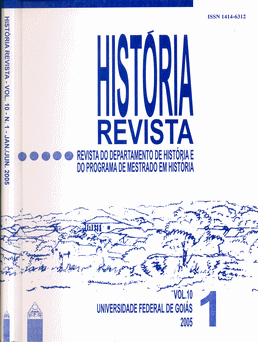DE FOGO MORTO: MUDANÇA SOCIAL E CRISE DOS PADRÕES TRADICIONAIS DE MASCULINIDADE NO NORDESTE DO COMEÇO DO SÉCULO XX
DOI :
https://doi.org/10.5216/hr.v10i1.10103Résumé
Este texto analisa a crise dos padrões tradicionais de masculinidade no Nordeste, no começo do século XX. Partindo da metáfora sugerida pelo título do romance de José Lins do Rego, Fogo morto o texto procura abordar a relação que está presente no discurso literário do autor entre o declínio da economia açucareira e da sociedade do engenho bangüê e a crise de um certo padrão de masculinidade, de certas formas de ser homem que haviam predominado na chamada sociedade patriarcal. Não era apenas o engenho que estava de fogo morto, mas também toda uma geração de homens que viviam uma profunda crise de identidade ao não poderem mais atualizar em suas vidas o modelo de sujeito masculino representado pelos patriarcas dos engenhos, seus avôs. A emergência progressiva de uma sociedade urbano-industrial e de novos padrões burgueses de sociabilidade, bem como da família nuclear, solapava as identidades desses homens, que viam amedrontados a emergência do que consideravam a feminização da sociedade, a desvirilização dos costumes. Homens perdidos, homens de engenho.
Palavras-chave: Mudança social, crise da masculinidade, Nordeste, discurso literário, José Lins do Rego.
Téléchargements
Téléchargements
Publié-e
Comment citer
Numéro
Rubrique
Licence
Declaração de Direito Autoral
Concedo à História Revista o direito de primeira publicação da versão revisada do meu artigo, licenciado sob a Licença Creative Commons Attribution, que permite o compartilhamento do trabalho com reconhecimento da autoria e publicação inicial nesta revista.
Afirmo ainda que meu artigo não está sendo submetido a outra publicação e não foi publicado na íntegra em outro periódico, assumindo total responsabilidade por sua originalidade, podendo incidir sobre mim eventuais encargos decorrentes de reivindicação, por parte de terceiros, em relação à autoria do mesmo.



